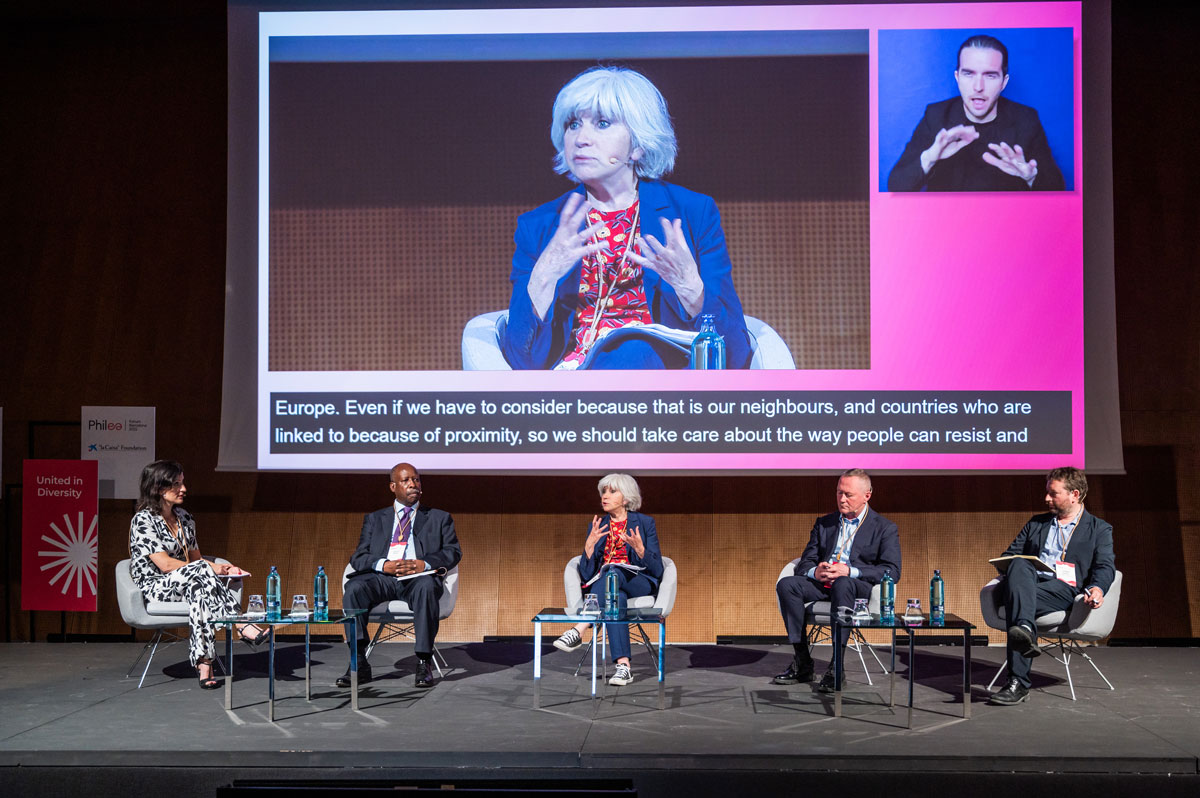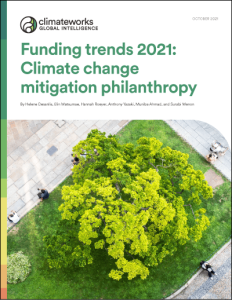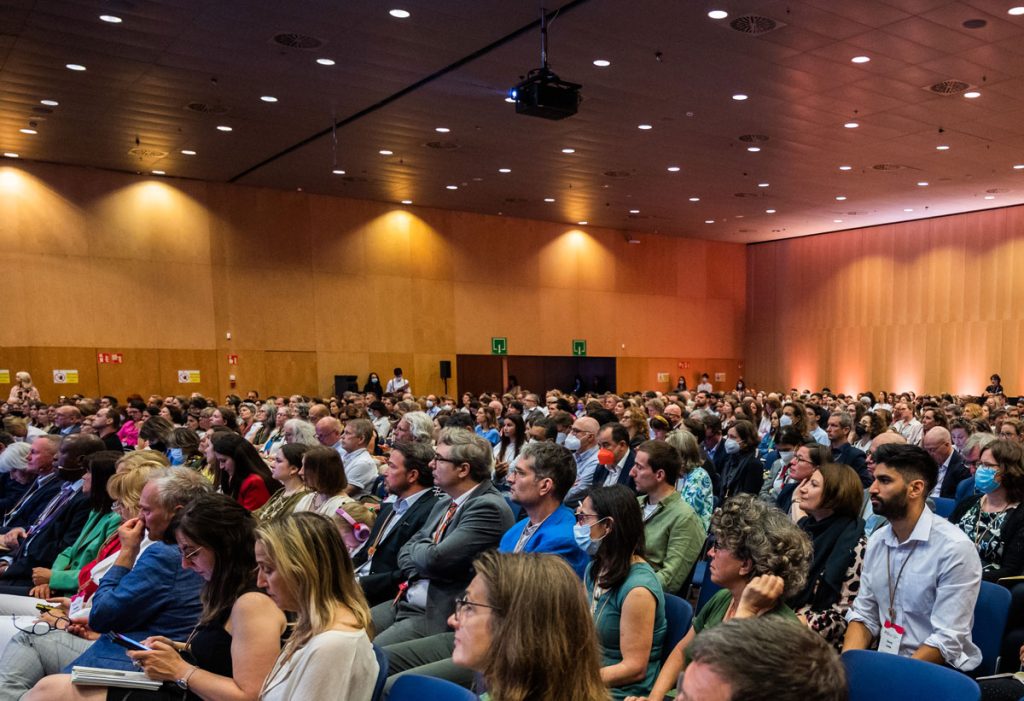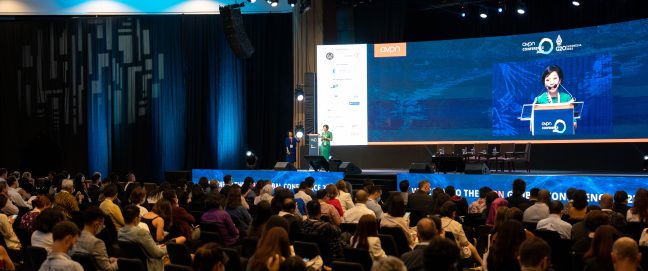It is the end of May, and southern Spain is experiencing a heatwave so dramatic that temperatures in some cities are 16 degrees Celsius above average. A spokesperson for AEMET, the country’s national weather agency, calls the heatwave ‘one of the most intense episodes in the last 20 years’.
But when I meet Laurence Tubiana, who worked behind the scenes in 2015 to help get the COP21 agreement in Paris across the line, over a morning cup of coffee in Barcelona, the extreme weather doesn’t touch us. We are sitting on a hotel roof, with the Mediterranean on one side and the city on the other.

Laurence Tubiana addresses the Philea Forum in the opening keynote session. Photo credit: Philea
Tubiana, who took the role of CEO at the European Climate Foundation in 2017, is in Barcelona to deliver a message to European philanthropy at the annual Philea Forum – the infrastructure organisation’s first since the European Foundation Centre and Dafne ‘converged’ into Philea several months ago. Just after we speak, she addresses those gathered at the conference’s opening keynote:
‘Climate is the bond that can unify people’, she says, to the more than 700 gathered – an audience that includes some of the most influential actors in European philanthropy.
Between business, government, philanthropy, ‘climate tends to be the bond,’ Tubiana says. ‘It can be a healing factor’.
Will the sector listen?
On overlapping crises
When it comes to centring climate work amidst a world suffering many crises at once ‘there are two temptations,’ Tubiana says. ‘One is to say anyway, these crises are big but the climate crisis is even bigger. That doesn’t work because people cannot focus on so many crises at the same time.
‘My advice, and I think it’s working now at least in Europe, is to link these crises altogether and to explain that if you don’t have a systemic change, we cannot bring a consistent response to them.
Philanthropy, by definition, is weak because we have no real instrument of power. It’s about soft power. But actually, you have many, many instruments if you use them strategically.
‘Energy security, it’s quite easy now to show that if we had more independence, we would not be subject so much to volatility and to this terrible choice: we fund Putin’s war or we destroy the economy. That should not happen. Energy security is quite close to security, the traditional meaning of security. And more broadly when you look at countries that are really affected by climate change. What is human security? It is very linked to climate change as well.
‘I think it’s better for the climate movement to think beyond its borders. I’m arguing we have to have a systemic view. If you don’t make the link with many other elements in the society, we just miss the point.’
On the invasion of Ukraine and Europe’s energy problem
I ask Tubiana to elaborate on the question of energy security, in light of the Russian war in Ukraine. In the UK, I tell her, the government has advanced in their plan to greenlight exploration for oil and gas in the North Sea – something the UK Government’s High Level Climate Action Champion explicitly told Alliance magazine wouldn’t happen.
‘We don’t need more exploration. You look at that famous IEA report on how to be more or less consistent with 1.5C, you have to stop exploration anywhere,’ she says.
‘I think every country, particularly in Europe, is faced with a choice. Should we backtrack, or should we stick with going in the general good direction? The problem is to put in place the two elements: classical energy efficiency and saving, and systemic change of the way we live. But also, to boost the investment in renewable energy. Of course, you see the incumbents of the sector saying, you know, we have to invest more and try to get more licenses to operate. But that is the short-term view.
‘It’s a very difficult battle, and that’s where philanthropy has to come in very strongly.’
On COP27 in Egypt
Before taking the help at ECF, Tubiana was France’s Climate Change Ambassador and Special Representative for COP21. Her work helped get the Paris Agreement across the line. What does she want to see from this November’s COP in Sharm el-Sheikh, Egypt?
I think the sector should be more: more strategic, more systemic, bolder. They cannot just say: ‘oh, we are doing nice projects here and there, and we feel good’. You have to do the systems change work.
‘That’s very straightforward,’ she says. ‘All countries in Glasgow almost 200 countries pledged to present better climate plans. They should be national, determined contributions – and also increase climate finance. We have to see that happen.
‘I know that the political context will be very difficult for many reasons: the economic crisis, inflation, and of course, the Russian war. All are elements that don’t favour international cooperation, but it will be really important.’
On the influence of the philanthropy sector
Philanthropy and the billionaires that propel much of it have increasingly assumed more influential roles at the COPs. Last year, both Bill Gates and Jeff Bezos were granted access to some of the biggest actors at Glasgow’s COP26 last November. But even aside from the big-name billionaires, foundation leaders drove a lot of action at COP26, like the methane pledge catalysed by philanthropy and now supported by 100+ nations or the $1.7 billion for Indigenous communities to protect forests.
I ask Tubiana, an incredibly influential voice herself, how she uses her power.
‘Well, the most important actors at the COPs are the smaller countries and the most affected ones. Many times everybody thinks: oh, we should have an agreement between the 20 most important countries. They are the ones producing 80 per cent of the emissions globally, so we should have a club of these countries making commitments. But it’s never worked, because these countries have conflicting interests – they want to keep growing. And if there is not this moral imperative that comes from the countries that are most affected, as well as the less-developed countries, then there is no ambition. That was very much a lesson that I tried to pass to all countries, and I think that the Egyptian government is very sensitive to that.
‘It’s a COP that is taking place in Africa, so adaptation is now looming large. We cannot avoid that now! We have to really put money into adaptation. I was talking with one of my friends, who is an Indigenous leader, and she was telling me that in her region there has been a succession of floods, and immediately after a drought. And the two were devastating. We cannot just avoid that question anymore. Some countries will not be able to rebuild after a major cyclone.’
On funding for loss and damage
The first ever mention of ‘loss and damage’ in a UNFCC document was in 1991, when the Parties agreed that industrialised, developed countries would contribute financially to the burden of loss and damage suffered by vulnerable countries. What’s taking so long on the loss and damage finance, I ask Tubiana? At COP26, there was a commitment of $3 million from a few foundations, including ECF, but the COP ended without any major commitments.
‘Definitely $3 million was just symbolic’, Tubiana says. ‘We decided to launch that to say: we cannot just say no again and again, that there will be no funding associated with loss and damages. We could just not ignore it. So, it was more of a symbolic gesture, after the Scottish government decided to put some money there.
‘Climate is the bond that can unify people’, Tubiana says, to the more than 700 gathered at the Philea Forum – an audience that includes some of the most influential actors in European philanthropy.
‘And there are not enough resources in philanthropy alone for this. Climate funding is now a little bit less than $2 billion a year, just incommensurate with what the needs are. We have to be modest, but I think it signalled that you cannot just say there will never be money. Especially because debt is piling up for many affected countries. Already, years ago – it was a wake-up call – a Caribbean Island came forward and said: ‘we have cyclones every year, we borrow money to build infrastructure, and they are destroyed. We have not even paid back the first loan, which has already just disappeared.
‘I think in Sharm there will be this combination about the loss and damages from the finance side, as well as the debt that is mounting and how to deal with that issue. And on top of that, inflation and commodity prices – as well as energy and food. It is an element that cannot be ignored, we cannot just speak about climate and ignore all of what is happening on the macroeconomic side.’
On climate’s small funding fraction

Research by ClimateWorks in 2021 found that while new donors and commitments drove momentum in climate philanthropy, leading to a 14 per cent increase in philanthropic giving for climate change mitigation, climate giving remains less than 2 per cent of all philanthropy.
Climate funding is still less than 2 per cent of all philanthropy – a barrier it’s been unable to break, even though the amount committed to climate has doubled over the last five years. Does the sector need to grow the amount they commit to climate, or does it need to focus on directing and effectively using the funding it does have?
‘Whenever new funders arrive, they have this idea that we will find a silver bullet, you know, the solution that will fix it all. And of course, that won’t happen. The new funders have to understand the complexity of the problem. It’s a systemic issue, it’s not one size fits all. For example, we can all drive electric cars, but then we would produce more electric cars, which have a carbon footprint. And they wouldn’t reduce emissions from agriculture land use.
‘It is systemic behaviour, societal change that we need. That’s where the new generation of philanthropy is maybe not so adapted to that, whereas the older generation is used to thinking in a holistic way.
‘Now the idea is we have to find a shortcut – and I understand why because we are all panicked by the looming catastrophe of climate change. But nevertheless, even if it’s a looming catastrophe, there are no shortcuts. We need to have behavioural change. We have to have government policy change. We have to have industry and companies being serious about how they reduce emissions.
On how the European Climate Foundation works
Since Tubiana joined the Foundation, its budget has more than doubled. I ask her how ECF makes the most of their spending.
‘I built on a very solid base, which was there when I arrived. We had very good expertise, but I understood that we needed to have these more systemic elements on board. That’s why we needed to increase our budget,’ Tubiana says.
‘We have structures that can allow us to have a more efficient allocation of funding. The first is mobilisation across the organisation on issues that we are tracking at the moment. For example, we feel that right now – because of inflation and the economic crisis – there is a risk that some political movements would like to present climate policies as anti-people and anti-well-being. So, we tried to launch a campaign that said: actually, it’s the contrary. There is inflation, because of fossil fuel volatility and price volatility in the global market, and the best way to isolate the consumer is to have more renewable energy.
‘Then we try to think about philanthropy strategically. For example, if you want to build infrastructure for NGOs, then philanthropy has to realise what it needs is to develop civil society capacity. And realise this is not a one-year effort. Support has to be prolonged. We have to look for new fields and new organisations – and sometimes help build them if they’re not there. Because, when there is a crisis, this is who will react quickly to a particular situation. And do to that they have to be there already, and they have to have capacity already. We have now almost 1,000 grantees and partners – we have to keep supporting them, and we have to keep increasing that number.
‘The beauty of philanthropy is you can use many, many instruments. In government, you are in a particular job, and you have a number of policy instruments. You cannot just decide on the exchange rate if you are the environment minister for example. But in philanthropy, you can go from campaigning to building an organisation to research or litigation or even dialogue. Philanthropy, by definition, is weak because we have no real instrument of power. It’s about soft power. But actually, you have many, many instruments if you use them strategically.’

Audience members listen to Laurence Tubiana offer some remarks during the opening keynote of the 2022 Philea Forum in Barcelona. Photo credit: Philea
A message to European philanthropy
The Philea Forum is about to begin. Before Tubiana goes, I ask her if she has a message for European philanthropy.
‘For now, they invest very little in climate. That is the first point – most investment is needed. The second point is that I think they should be doing more advocacy, as colleagues are doing in US. You know, building civil society, pushing government and economic actors to do their job – this is absolutely central. Nobody else will do it. If philanthropy doesn’t do that, if philanthropy doesn’t empower civil society, it will not happen. It’s a lot of responsibility, but it is very specific.
‘I think the sector should be more: more strategic, more systemic, bolder. They cannot just say: ‘oh, we are doing nice projects here and there, and we feel good’. You have to do the systems change work.
‘Philanthropy money is free money, it’s flexible, and you can take risks. So that’s the message.’
Elika Roohi is Digital Editor at Alliance magazine.
For more of Alliance’s coverage from Philea Forum 2022 read ‘Philea Forum 2022: The time is now‘,



Comments (0)